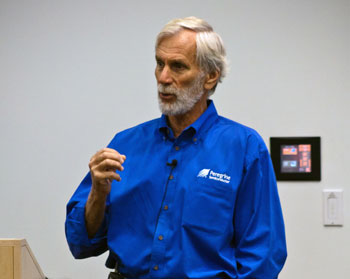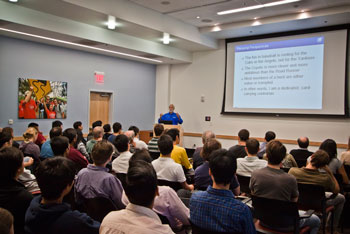
By:
- Ioana Patringenaru
Published Date
By:
- Ioana Patringenaru
Share This:
'Be Different or Die:' Words of Advice from Entrepreneur and Peregrine Semiconductor Founder Ron Reedy

Peregrine Semiconductor co-founder Ron Reedy speaks at the Jacobs School of Engineering during a recent event.
Capital comes with instructions. Everything takes π times longer and costs π times as much as you thought. Information only has value when it’s in motion. These are the three rules that govern the interaction of entrepreneurism with technology, according to Ron Reedy, UC San Diego alumnus and co-founder and chief operations officer of San Diego-based Peregrine Semiconductor.
Reedy outlined these rules— and more—during a talk he recently gave at the Jacobs School of Engineering. Reedy, who co-founded Peregrine with fellow UC San Diego alum Mark Burgener, spoke about his personal views and experiences, the semi-conductor market and silicon on sapphire, the groundbreaking technology behind his company.
Reedy is quick to point out that he and Burgener did not invent silicon on sapphire. They figured out how it really worked and how to commercialize it. The company has shipped more than 800 million chips. These chips have been in everything from handsets to satellites. “We’re on every single planet in the solar system,” Reedy said. “We’ve gone to asteroids. We’ve collected comet dust. We’re in 500 million cell phones.”
Ron Reedy, a UC San Diego alumnus and co-founder of Peregrine Semiconductor, talks about succeeding as an entrepreneur in the technology sector and about silicon on sapphire, the technology that made his company successful.
Reedy earned a Ph.D. in electrical engineering and applied physics from UC San Diego in 1984. Burgener followed with a Ph.D. in physics from UCSD in 1988. The two founded Peregrine in 1989. Since then, Reedy has come up with three important guidelines for entrepreneurs who work in the technology sector. “Capital is the root energy in this system,” he said. In order to obtain it, you need a business plan or a funding check, whose instructions you must follow closely.
Also, everything takes a little more than three times as long, or π, than planned for. For example, he thought Peregrine, which he started in 1989, would be dead or successful by 1995. But it’s taken 20 years to succeed. Finally, communication is key to success. If you know the cure for cancer but don’t tell anyone, don’t write it down and don’t start a company, then that information is useless, Reedy said. “The corollary to that is that information has more value the faster it goes,” he also said. “That’s what the Internet has done.”

Reedy also is a UC San Diego alumnus. He earned a Ph.D. in electrical engineering and applied physics from UC San Diego in 1984
Reedy attributes part of his success to his contrarian tendencies. “I’m much more interested in the coyote than in the road runner,” he said. “I think the coyote is way more entrepreneurial.” It all boils down to one simple sentence, he added, quoting author and Silicon Valley entrepreneur Bill Davidow: “Be different or die.” This belief allowed him to think differently about silicon and sapphire, he said.
Reedy also credits the work ethic and discipline he learned as a Ph.D. student at UC San Diego for his success. His advisor was Professor Sing H. Lee, now emeritus, in the electrical and computer engineering department, who insisted on following a line of research until its logical conclusion, Reedy said. He added he believes universities need to keep their students focused on creating companies.
“One of the primary goals for universities these days is to create that entrepreneurial class,” he said.
Share This:
You May Also Like
Stay in the Know
Keep up with all the latest from UC San Diego. Subscribe to the newsletter today.


